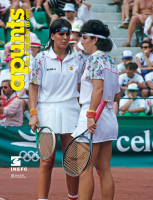Physical-sports Activities in “Lo Carrilet” Residential Centre for Educational Action
Article Sidebar

Main Article Content
This research analyses physical and sports activity among children and adolescents living in an RCEA (residential centre for educational action) with the objective of presenting the benefits and improvements this activity brings them. The research provides evidence that physical activity leads to improvements in their quality of life, yet at the same time it detects the weaker points in the sports process, including the choice of activity, the methodology, excessive competitiveness, and the failure to track the children’s or adolescents’ development. The purpose of this study is to answer the following questions: How are physical education and sports experienced in a foster care centre? What role do they play? How do the children and adolescents view them? Can physical education help improve the behaviour of the children and adolescents living in these centres? Can physical education help in their socialisation? The children and adolescents from the centre (n=23), the guardians (n=8) and the coaches and instructors of the extracurricular sports activity in which the children and adolescents take part (n=15) participated in this study. The data were collected via uestionnaires and face-to-face interviews. The results of the study are shared with the RCEA in order to launch new avenues of action and create a protocol for choosing sports activities bearing in mind the characteristics of the child, the activity, the coach and the place where it is played.